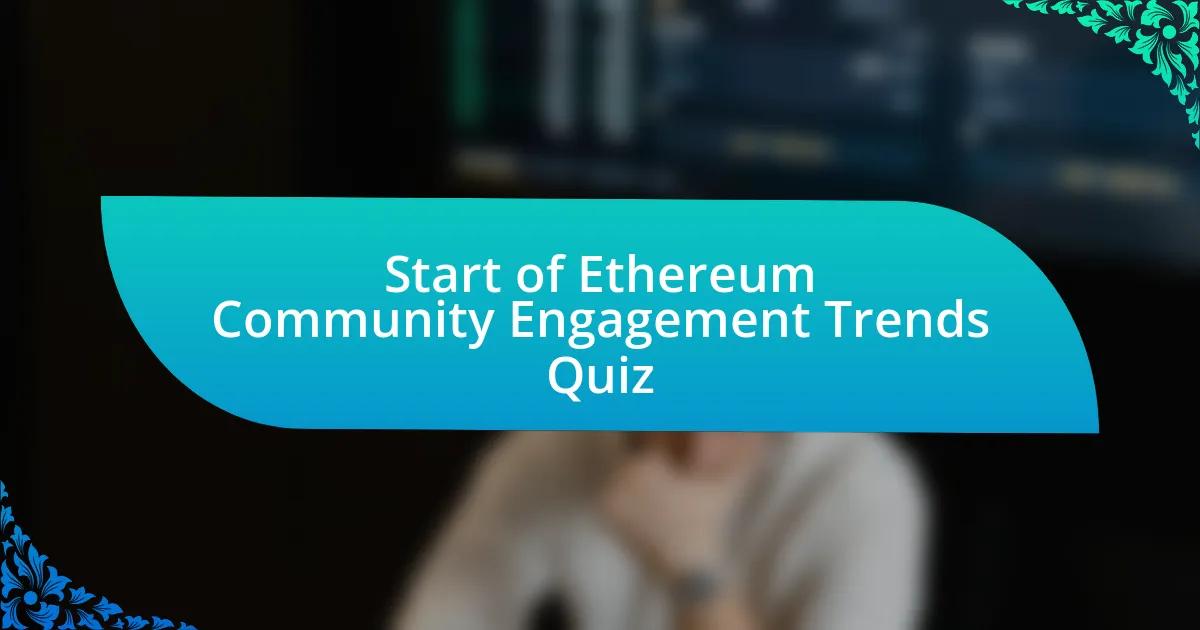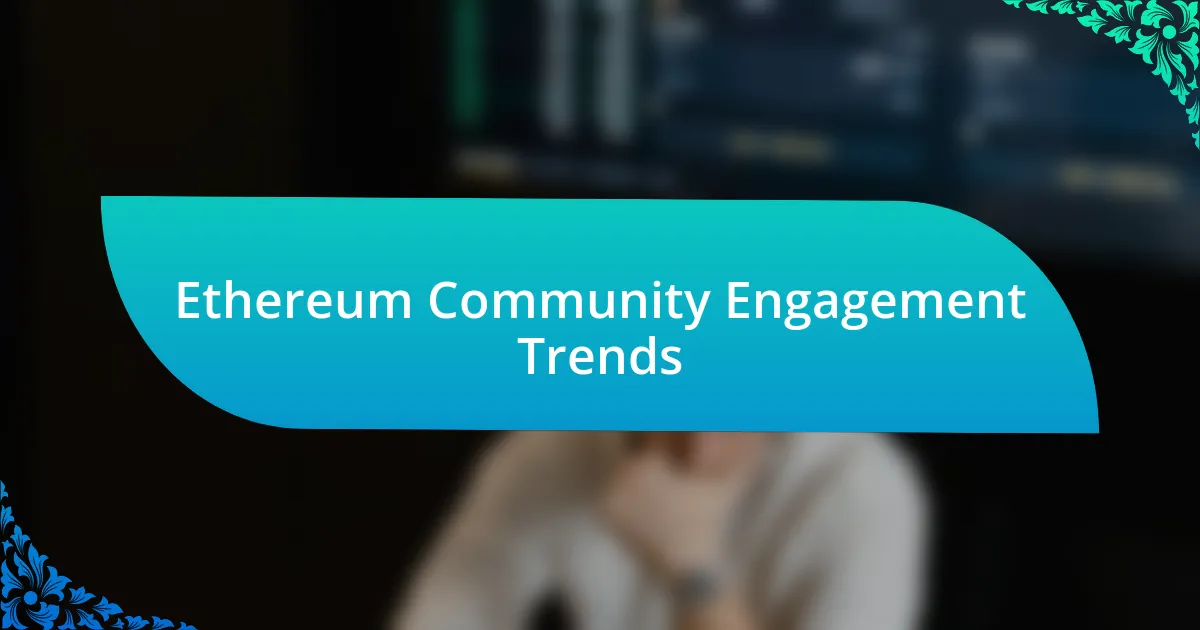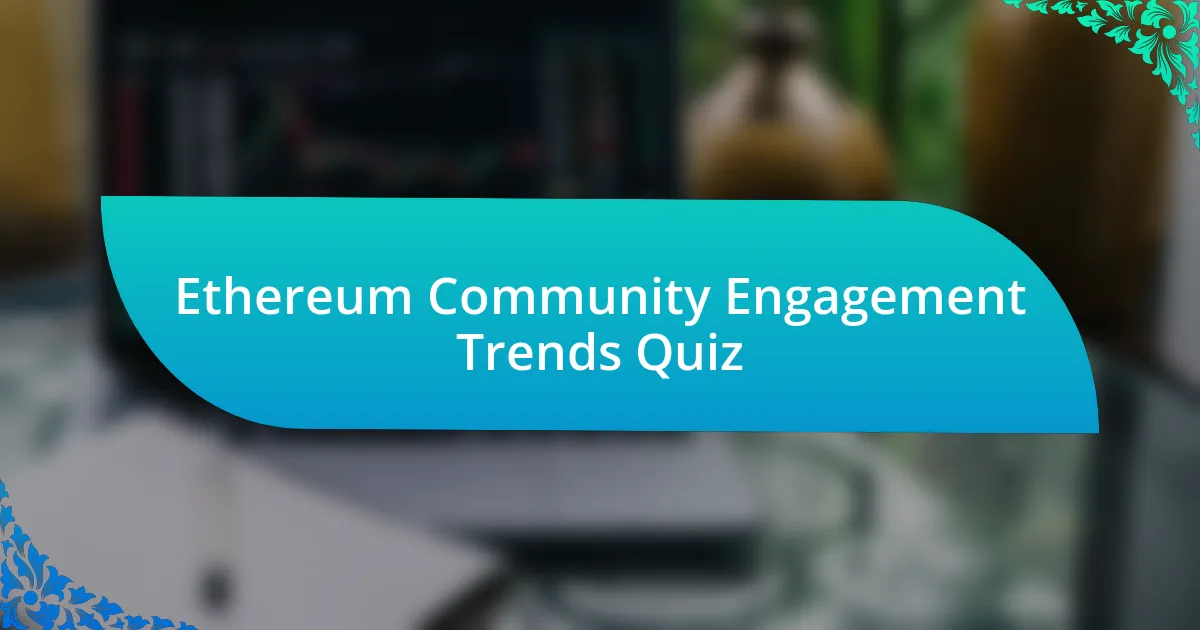
Start of Ethereum Community Engagement Trends Quiz
1. What is a common use case for MetaMask in the Ethereum community?
- Playing video games
- Sending and receiving Ethereum tokens
- Editing photos and videos
- Watching videos online
2. How is the Ethereum community engaging with DeFi projects?
- Through individual traders solely using centralized exchanges.
- By implementing stricter regulations on crypto exchanges.
- By focusing solely on NFT projects and markets.
- Through community-building events and hackathons.
3. What phenomenon describes the rise in unique Ethereum addresses over time?
- Block Confirmation
- Transaction Volume
- Address Growth
- Smart Contract Execution
4. What event marked the peak number of daily active Ethereum addresses?
- 500,003 on June 15, 2023.
- 1,420,187 on December 9, 2022.
- 321,789 on March 30, 2021.
- 2,000,000 on January 1, 2025.
5. How does Total Value Locked (TVL) impact investor confidence in Ethereum?
- It indicates the total number of cryptocurrencies available on the market.
- It shows the number of new transactions processed on the Ethereum network.
- It reflects growing trust and investment in decentralized finance applications on Ethereum.
- It measures the average gas fees paid by users on the Ethereum blockchain.
6. In comparing Ethereum to Bitcoin, what distinguishes their community engagement?
- Ethereum focuses solely on price speculation.
- Bitcoin promotes a single-use case for transactions only.
- Ethereum has a more diverse and active developer community.
- Bitcoin has a larger number of casual forum users.
7. What factors contribute to the growing number of active Ethereum addresses?
- A rise in NFT sales
- Decrease in gas fees
- A surge in transaction volume
- Increased adoption of DeFi applications
8. How does the Ethereum community utilize decentralized identity solutions?
- Decentralized identity solutions are used only for social media profiles.
- Decentralized identity solutions primarily manage traditional bank accounts.
- Decentralized identity solutions focus on creating centralized user databases.
- Decentralized identity solutions help improve user verification for protocols.
9. What role do ZK proofs play in protecting user information within the Ethereum ecosystem?
- ZK proofs require users to share their personal information.
- ZK proofs are used for mining new tokens in Ethereum.
- ZK proofs only enhance transaction speed on Ethereum.
- ZK proofs help verify transactions without revealing user data.
10. What is the expected outcome of introducing Account Abstraction to Ethereum?
- Elimination of smart contracts on the network.
- Mandatory upgrades for all Ethereum wallets.
- Gasless transactions for DApps and social recovery solutions.
- Increased transaction confirmation times for all users.
11. How does the Dencun update aim to improve user experience on the Ethereum network?
- The Dencun update is designed to increase the maximum transaction limit for Ethereum users, allowing for larger transactions.
- The Dencun update mainly seeks to shift Ethereum`s consensus mechanism from Proof of Work to Proof of Stake entirely.
- The Dencun update aims to enhance Ethereum’s efficiency and gas costs with support for new opcodes on the EVM and protocol level changes such as Proto-Danksharding.
- The Dencun update primarily focuses on introducing a new Ethereum token standard that enhances smart contract capabilities.
12. What is the significance of the Proto-Danksharding transaction type?
- Proto-Danksharding enables centralized transaction processing.
- Proto-Danksharding is a new Ethereum consensus mechanism.
- Proto-Danksharding reduces transaction costs for Layer 2 users.
- Proto-Danksharding increases block size limits significantly.
13. How are Ethereum developers fostering a more inviting UX for new users?
- They are simplifying the onboarding process for new users.
- They are promoting more complex programming languages for developers.
- They are focusing on enterprise solutions instead of user experience.
- They are increasing transaction fees to fund development.
14. What trends in community funding initiatives are being observed within the Ethereum ecosystem?
- Community funding is primarily focused on centralized control.
- There`s an increasing emphasis on retroactive funding models and sustainable revenue streams.
- Funding initiatives are being abandoned due to lack of interest.
- All funding is being channeled exclusively through traditional banks.
15. How do emergent protocols like EIP-4844 align with community development efforts?
- EIP-4844 prioritizes corporate interests over community needs.
- EIP-4844 limits community input and stifles development efforts.
- EIP-4844 supports community-driven improvements and innovation on Ethereum.
- EIP-4844 is unrelated to the Ethereum community`s development.
16. What implications do decentralized AI trends have for the Ethereum ecosystem in 2024?
- Decentralized AI will solely be used for cryptocurrency trading on Ethereum.
- Decentralized AI will only focus on gaming applications on Ethereum.
- Decentralized AI will enhance security and interoperability in Ethereum applications.
- Decentralized AI will weaken the overall governance of Ethereum.
17. In what ways does blockchain support disaster response within the Ethereum community?
- Blockchain only provides cryptocurrency wallets for personal use in disaster scenarios.
- Blockchain mainly tracks vehicle registrations and identifies ownership history for conditions.
- Blockchain solely operates as a voting system to elect community leaders during disasters.
- Blockchain facilitates direct cash transfers, fundraising for NGOs, and serves as the foundation for tools to build more resilient communities.
18. What innovations are being discussed regarding public goods funding in Ethereum?
- Discussions revolve around creating a new cryptocurrency dedicated solely to public goods.
- The emphasis is on centralized funding by major investors to support development projects.
- Innovations include implementing instant loans and automated trading tools for public goods.
- The focus is on growing the Web3 Public Goods Funding ecosystem with a greater emphasis on retroactive funding and self-sustaining models tied to specific blockchains and ecosystems.
19. How might the recent Bitcoin Spot ETF approval affect Ethereum community engagement?
- This approval will have no impact on the Ethereum community as it focuses solely on Bitcoin.
- The approval will push Ethereum developers to abandon their projects due to reduced interest.
- It might lead to a decrease in Ethereum`s transaction fees, causing less engagement.
- The approval is expected to instill greater confidence among the public and crypto users, further encouraging them to explore and engage with various Ethereum blockchain DApps.
20. What collaborative strategies are being employed by Ethereum developers for community impact?
- Community grants programs and collaborative workshops.
- Exclusive partnerships with traditional banks.
- Single developer projects for personal gain.
- Limiting access to the Ethereum codebase.
21. How does the Ethereum community view the competition with emerging Layer 2 solutions?
- The Ethereum community views Layer 2 solutions as a direct threat to its relevance.
- The Ethereum community believes that Layer 2 solutions will likely fail and disappear.
- The Ethereum community sees emerging Layer 2 solutions as complementary to its ecosystem.
- The Ethereum community considers Layer 2 solutions unnecessary and disadvantageous.
22. What are the implications of modularized tools for Ethereum developers?
- No impact on tool usage or development flexibility.
- A uniform toolset that eliminates all customization.
- Increased complexity in using existing tools.
- Easier integration of tools into development projects.
23. How does the Ethereum community respond to changes in network protocols?
- By ignoring community feedback altogether.
- By adopting changes randomly without consultation.
- Through community consensus and improvement proposals.
- Through mandatory updates enforced by the developers.
24. What trends suggest a more inclusive Ethereum ecosystem for underserved communities?
- Restricting access to blockchain technology for all demographics.
- Focus on user-friendly blockchain tools for underserved communities.
- Elimination of all decentralized applications from the ecosystem.
- Increase in gas fees affecting all users equally.
25. In what ways are DAOs experimenting with governance models within the Ethereum community?
- DAOs are exclusively using traditional company structures for decision-making.
- DAOs rely solely on automated voting without any human oversight.
- Ongoing experimentation will take place to “crack the code” of DAO engagement, including a mix of centralized and decentralized models, layers of governance, and incentivization mechanisms.
- DAOs are abandoning all forms of governance to focus solely on decentralized finance.
26. How are public perception and participation in Ethereum influenced by market trends?
- Market trends only influence Ethereum`s transaction fees but not user participation.
- Market trends have little to no effect on public interest in Ethereum.
- Market trends significantly impact the visibility and engagement levels of Ethereum users.
- Market trends solely dictate the technical development of Ethereum projects.
27. What is a significant endpoint expected from recent Ethereum protocol changes?
- Removal of all transaction fees entirely
- More centralized control over the network
- Reduction of smart contract capabilities
- Increased efficiency in transaction processing
28. How does Ethereum’s community adapt to technological advancements and user feedback?
- The community discourages feedback to maintain consistency in development.
- The community ignores user suggestions and relies only on developer decisions.
- The community implements regular upgrades based on user suggestions and technological trends.
- The community waits for regulatory changes before making any updates.
29. What emerging trends in user engagement are being monitored by Ethereum developers?
- Assessing the stability of traditional banking systems.
- Monitoring user adoption for Ethereum-based applications.
- Tracking social media engagement statistics.
- Experimenting with new video game platforms.
30. How is the Ethereum community capitalizing on rising NFT popularity?
- The Ethereum community is launching NFT marketplaces and platforms to support creators.
- The Ethereum community is moving to centralize its blockchain services.
- The Ethereum community is ignoring NFT development entirely.
- The Ethereum community is investing solely in traditional stocks.

Congratulations! You’ve Successfully Completed the Quiz
Thank you for participating in the quiz on Ethereum Community Engagement Trends. We hope you found it engaging and informative. This experience not only tested your knowledge but also highlighted essential trends within the Ethereum community. By reflecting on these trends, you now have a better understanding of how community dynamics influence blockchain development.
Throughout the quiz, you may have learned about various ways communities interact with Ethereum, including governance models and social engagement tactics. Understanding these aspects is critical in grasping how Ethereum evolves over time. This knowledge can empower you to contribute more effectively to discussions or projects within the community.
As you continue your learning journey, we invite you to explore the next section on this page. It offers valuable insights that will deepen your understanding of Ethereum Community Engagement Trends. Whether you are a newcomer or a seasoned member, there is always more to learn. Enjoy expanding your knowledge!

Ethereum Community Engagement Trends
Overview of Ethereum Community Engagement
Ethereum community engagement refers to the collective involvement of users, developers, and stakeholders in the Ethereum ecosystem. This engagement manifests through various channels such as forums, social media, and decentralized applications. Engagement is crucial for the development and growth of Ethereum, as it fosters collaboration, innovation, and support within the community.
Key Platforms for Community Interaction
The primary platforms for Ethereum community interaction include Discord, Reddit, and GitHub. Discord serves as a real-time communication space where developers and users discuss projects and share updates. Reddit hosts numerous forums where community members engage in discussions about Ethereum-related topics. GitHub is essential for collaboration on development projects, allowing for code sharing and version control. The diverse platforms enable various forms of engagement according to user preferences.
Trends in Community Educational Initiatives
Educational initiatives in the Ethereum community focus on increasing knowledge and understanding of blockchain technology. Workshops, webinars, and online courses are gaining popularity among users. These initiatives often cover topics like smart contract development, decentralized finance (DeFi), and non-fungible tokens (NFTs). The goal is to empower community members with the skills necessary to contribute effectively to the ecosystem.
Impact of Social Media on Community Engagement
Social media significantly influences Ethereum community engagement. Platforms like Twitter and YouTube are integral for sharing updates, news, and insights. Influencers and thought leaders often disseminate information that shapes public opinion and community trends. Engagement through retweets, shares, and comments creates a dynamic environment for discussion and awareness, further expanding the community’s reach.
Emerging Trends: DAO Participation and Governance
Decentralized Autonomous Organizations (DAOs) are increasingly central to Ethereum community engagement. DAOs allow members to participate directly in governance decisions, shaping the direction of projects and initiatives. This trend promotes more active involvement among users, as decisions impact their interests and investments. The rise of DAOs signals a shift towards more democratic and participatory models within the Ethereum ecosystem.
What are the current trends in Ethereum community engagement?
Current trends in Ethereum community engagement include increased participation in governance, growth of decentralized finance (DeFi) projects, and heightened attention to non-fungible tokens (NFTs). The Ethereum community is actively involved in proposals related to network upgrades, with significant turnout in voting processes. As of 2023, over 50% of Ethereum holders have participated in staking or governance activities, indicating a higher level of engagement compared to previous years.
How is the Ethereum community utilizing social media for engagement?
The Ethereum community utilizes social media platforms like Twitter, Discord, and Reddit to share information, discuss projects, and foster collaborations. These platforms facilitate real-time interactions, allowing community members to provide feedback on developments and share educational content. In 2023, Ethereum-related Twitter hashtags gained millions of impressions monthly, reflecting active discourse around the ecosystem.
Where can Ethereum community members find resources for engagement?
Ethereum community members can find resources for engagement on platforms such as the official Ethereum website, GitHub, and community forums like Ethereum Stack Exchange. These platforms offer documentation, project updates, and opportunities for collaboration. GitHub alone has thousands of active repositories related to Ethereum development, showcasing the community’s commitment to innovation and contribution.
When do major events for the Ethereum community typically occur?
Major events for the Ethereum community typically occur during annual conferences such as Devcon and ETHGlobal hackathons, which are usually scheduled in the fall. Additionally, regular meetups and webinars are held throughout the year to discuss updates and developments. The last Devcon, held in November 2022, attracted thousands of attendees, emphasizing the community’s vibrant engagement.
Who leads the Ethereum community engagement initiatives?
Leaders of Ethereum community engagement initiatives include core developers, members of the Ethereum Foundation, and influential figures within the ecosystem. They guide discussions on proposed upgrades and foster awareness through community outreach. For instance, Vitalik Buterin, as a co-founder, plays a significant role in setting the direction for engagement and discussions surrounding Ethereum’s future.

